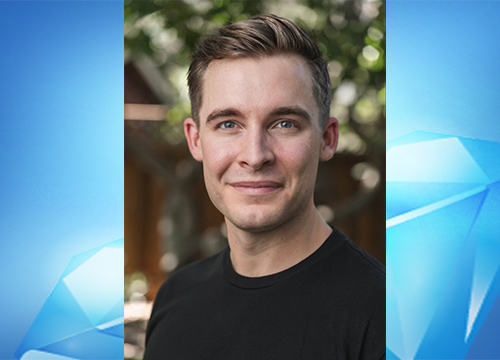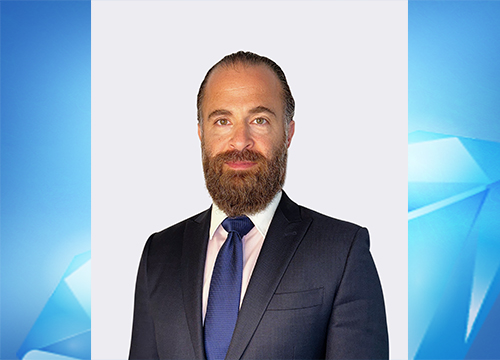Host Dan Breslin and Andrew Llewellyn discuss the unique and profitable real estate strategy of converting distressed, non-liquid commercial office buildings into highly liquid, cash-flowing residential-style boutique hotels designed for large group short term rentals. Llewellyn’s model works by acquiring property for the value of the “dirt” and transforming the asset. He capitalizes on Louisville’s favorable zoning and consistent demand, ensuring his properties are premium experiences rather than commodity rentals. Llewellyn views the operation as a “cash manufacturing machine,” optimizing efficiency and turnover using operational principles from books like Traction and The Goal.
Andrew Llewellyn & I Discuss Large Group Short Term Rental Investment:
- The Strategic Advantage of Office- to Apartments Conversion (00:26:50-00:28:37)
- Acquisition and Build Out Costs for the A12 Project (00:28:58-00:30:12)
- Key Market Factors for the Duplicating the Strategy (00:31:16-00:37:09)
- Future Pivot to Flex Space and Operational Strategy (00:40:04-00:46:26)
Relevant Episodes: (200+ Content Packed Interviews in Total)
- Investing in Hotels with Mike Stohler
- Profitable Short Term Rental Tips from Danielle & Culin Tate
- Get Max Cashflow from Buying Vacation Rental Property with Avery Carl
- How to Choose the Best Airbnb Real Estate Market | John Bianchi
Watch the episode here
Listen to the podcast here
Large Group Short Term Rental Investment With Andrew Llewellyn
Andrew Llewellyn, welcome to The REI Diamonds Show. How are you?
I’m great. Thanks for having me, Dan.
Getting Into Real Estate Through The Hospitality And Food Industry
For sure. Interesting topic and interesting asset class. I probably would label this maybe commercial real estate/short-term rental, which is intriguing. A lot of people are doing these mountain house short-term rentals. This is something new. Before we get into that topic, I have a question. Was it true that you were trying to open up a bakery business or something of that nature?
That’s some great research. Originally, we had purchased the building I’m in to be a wholesale bakery. Our city permitting council had other ideas for me in order to do the bakery. The cost shot up so much to the point where I was like, “I don’t think we can sell that many blueberry muffins to recoup that money.” During the tour when I bought the building, a buddy of mine had said, “You should Airbnb the whole place.” I thought it was a joke. It turns out that when I modeled it, we should Airbnb the whole place.
That’s pretty cool. What year was this?
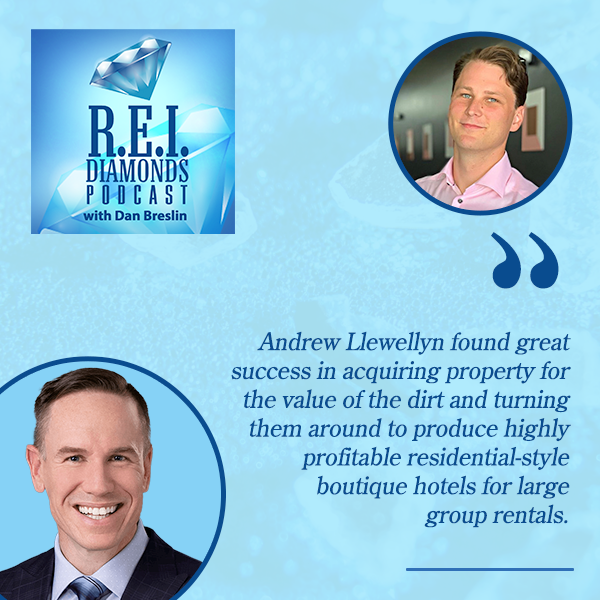
This was 2021. It was still in that “Is the world going to melt down?” COVID era. I had two ice cream shops. We were running a food truck with that concept and a wholesale bakery out of the back of the ice cream shop. We needed to move the wholesale bakery. That’s how we got to this property. It got into real estate by mistake.
From a location stamping question, I’m in Chicago right now, and you are in?
Louisville, Kentucky.
It will be relevant to the rest of what we’re going to cover here. Why the food trucks? Was that a business that had a low barrier to entry? Was it family? This is an interesting start. We don’t hear it often on this show.
The food truck was a mobile concept of what we were running in the ice cream shops. Our twist on the ice cream shop was that we were doing the European Liège waffle. That’s a yeasted dough with pearls of sugar in it. I had the thought to add that product to the menu because you have one new product, one new piece of equipment, and you get a whole new menu. We were doing ice cream on top of these waffles. They were the same toppings as ice cream. From a production standpoint, it was super simple to set ourselves apart from the competition.
Is that cyclical? It’s not hot year-round in Louisville.
It’s very cyclical. It’s a warm-weather business only.
Is it still operating, or did you make the decision to close that down?
When the lease ran out, I decided to close it down because we were doing so well with our short-term rentals. After COVID, they printed so much money. The cost of a 15 or 16-year-old kid to scoop ice cream became expensive. Plus, they had to take tips. The food cost went crazy. All of a sudden, to make the right margin that we were making, we stopped being a snack or a treat. We were like a meal. We were having $40 checkout tickets for ice cream. That doesn’t fly. That’s not sustainable.
That’s wild. We have this hospitality food industry entry point into real estate. It feels like it was more of a business than an investment. I would like to ask about investment philosophy. That would be the set of rules or your thought process around investing. Do you have an investment strategy at this point, like an investment philosophy? If so, what would that be like in a sentence?
Our investment strategy is to buy a building for what the dirt is worth, something unwanted that has been on the market for a while, with some potential, and in a good location.
You then turn that around.
I guess the most familiar term to people would be the BRRRR model. Run the BRRRR model on a commercial building and turn it into a hospitality.
Getting A 10,000-Square-Foot Five Apartment Property
I believe this is your building. Is this the building you’re in now?
That’s the building I’m in now. I am in the basement of that building. Our guest showed up at the bachelor party. We typically do a full property buyout on the weekend. About 25 guys showed up three hours early before check-in time. I’m down here in the basement doing this show.
Here’s the interesting thing. For people who are not watching, you can check this out. What is this, Swepson?
The best place to check us out is SuperStaysSTR.com.
You got that. This is the Swepson Guesthouse. This is 10,000 to 12,000 square feet. It’s a storefront with apartments above it. Those in Chicago and Philly know the deal with what this is. It’s 5,000 square feet per floor, give or take, maybe.
It’s about 3,300 a floor, 10,000 square feet total. We have apartments on every floor, including the storefront. We fogged that glass in and put apartments there. It’s pretty cool.
It’s an interesting loft-style construction layout here, 42 guests maybe, if you took the whole building. Is that right?
If you took the whole building and you packed it in, we can do 42 to 50, depending on how tight you want to pack it. Forty-two is a good place to stop.
This is spread across four or five apartment units total? What’s the layout?
It is across five apartment units, two on the first floor, two on the second, and then this cool, lofty space on the third floor. That winds up being the hangout space.
That’s a lofty spot. How many beds and baths per unit do you have in there?
It’s a mix. We have one four-bedroom unit. We have three three-bedroom units and one two-bedroom unit. It’s a bit of a mix.
How many bathrooms per?
There are two bathrooms per unit.
The details are important. I know you and I are looking at this, and you look at this every day because you’re working out there right now. For people reading, I’m trying to help paint the picture of what we have here. A 10,000-square-foot. I would call this a five Class-A apartments due to the construction, the detail, and design that we have here. What my mind goes to is, Airbnb is working right now. I’m sure it’s always going to work. You’re operating it very closely.
Even for somebody who’s going to make the loan on the property, co-invest, or own the property long term, if you don’t want to do the short-term rental thing at some point in the future, if the short-term rental thing becomes not a fad, or if people migrated away from it for some reason, the backup plan is you’re renting it out as an apartment building. You’re walking away with cashflows. Is that what you were thinking here?
When we decided to pivot from the bakery to this, it was like, “What’s plan B, C, and D if Airbnb doesn’t work out?” Plan B was, “We’ve got five great apartments in this building and a growing neighborhood. It should cover the note if the Airbnb doesn’t work out.” Luckily, it has worked out well.
One thing to highlight here, I have a property where I stay in the wintertime in Florida. I throw it on Airbnb. It offsets some of my expenses. It’s not a cashflow machine. It’s not a business I’m running. I don’t self-manage it. I’m not tweaking all the knobs and trying to make it push every last dollar the way that you can when you’re running the business. It was good the first year, and then 3, 4, 5, or I don’t know how many more, popped up in the same neighborhood.
One of the neighborhoods would allow it to happen. You could get a short-term rental there. It was legal. It was part of why I bought the house there. That’s why everyone else followed suit and moved in. Our creative property, 3,500 to 3,800 square feet, with the slides for the kids in the building and bunk beds. Suddenly, the neighbor down the street is putting in an outdoor basketball court and a pickleball court. They’ve gone Disneyland with it. There’s a ton of competition is where I’m getting at.
One of the niches in short-term rentals that you have taken advantage of here is that you can accommodate a small number of guests in one apartment unit. The thing that is hard to replicate is that somebody takes all five units and has the bachelor party, the wedding, and the corporate event. I look at a property like this, and I’m thinking to myself, “If I were going to have my family all together, we have a choice.”
We rent six or seven hotel rooms. It’s odd. We’re all eating down there in the public space. We find an interesting place like this. We take the whole building over, whether there are couples with kids, the grandparents, or what have you. You have this very unique place that you’ve created with a lot of flexibility and a high barrier to entry for someone else to come in here and compete with you.
With families, we find that they like that they can be together. There’s enough space to gather, have a meal, hang out, and be with one another. At the end of the night, as families do, you’re like, “I’m ready to get away. I want to go back to my unit. I’m good. I’ve had eight hours with you. That’s good. I want to go watch TV by myself.” You can do that. Families with kids who come here love that the kids are contained. The backyard’s fenced in, gated. They know where the kids are. The kids can run the whole building.
Large group short term rentals work best for families who want to gather for meals and hang out together in one common space.
It’s a great setup for families, large groups, and corporate retreats. We can see all our reasons that people stay with us up there. It’s a great place for everything. With the high barriers to entry, it is a big chunk of change to open one of these, and then to find a lender that believes that you can operate at this scale. That’s definitely a barrier to entry.
Breaking Down The Financial Aspect of The Property
Let’s run through what the numbers look like. What did this cost to buy? What did it cost to renovate? What is the high end of the rent if someone takes the whole building? What’s the low end of the rent? This thing is probably seasonal. You’re going to get more money at certain times of the year than the other.
We bought this in a questionably up-and-coming area during COVID. It was a big bet. It wasn’t for Airbnb like I talked about. We were like, “I hope the neighborhood turns around. It’ll be a great investment. We’ll have a cool property if the neighborhood turns around. If not, that’s okay. We’ll have a bakery. We’ll make it work.” We paid $980,000 for this building, which was not much. We spent about another $400,000 to renovate the first floor and furnish the place on one floor. When the property was purchased, it was this cool, lofty apartment on the third floor, and then two long-term tenants on the second floor. Their leases came up. They didn’t want to renew. That was another reason to push for this Airbnb project.
Did you also have to do some improvements on the other floors, or are they not quite like the other build-out?
They required, and I would put it in lipstick-on-a-pig category, a little bit of paint, a change in a couple of light fixtures, and a couple of bathroom vanities. It was nothing like the first floor, where we were putting in demising walls and plumbing. That was a complete gut and restart.
All in basis here, maybe 1.6 or 1.7, or something like that.
It is 1.5.
What are the rents looking like, high and low seasonally?
We’re typically running about $2,000 a night for the whole property. That works well for us. It produces plenty of cashflow. Depending on the month, it is $10,000 $15,000 in free cashflow.
That’s after the mortgage, the expenses, and the whole thing?
Yes. It’s a great deal.
Were you able to refinance all the cash out at the 1.5 basis?
We were. I’ll speak to that quickly. When we decided all of a sudden, we were doing real estate instead of ice cream and food service, it became clear that I needed to take a couple of courses. I found a couple of online courses. I don’t remember what they were, but I learned about cap rate, refinancing, and NOI. I got up to speed on everything. By the time we had started construction, I had an idea of what the process needed to be and how to execute on that.
You have the most accidental real estate beginning. There are people who have the accidental thing, but usually, it’s like, “I read Rich Dad Poor Dad. I found out about rental houses, and then I went out and did X, Y, Z to get into real estate.” You’re like, “We’re here making these ice cream pies. We couldn’t do it, so we decided that this would work,” then it did. On the website here, you have your newsletter. Sign up here. Keep in touch. That’s good, if anyone wants to check that out.
Understanding How A Residential-Style Boutique Hotel Works
That site that I looked at here is SwepsonGuesthouse.com. You could check out those photos for yourself or check out our video on YouTube. We have this first very interesting mini hotel/experience/oversized Airbnb asset class. I don’t know if a boutique hotel is how it fits. How would you define this? You watched a couple of courses on commercial real estate, so clearly, you are an expert by now. How would you define the asset class?
It sits in no man’s land. Let’s take the perspective of banks. If you go to a bank that loans on Airbnb, they say, “No, it’s a hotel. We don’t do that.” If you go to banks that do hotels, they say, “It walks like a duck. It’s an Airbnb. We don’t do that.” It’s in between. The term that we’ve come up with is residential-style boutique hotel. That’s the best way we figured out how to clearly describe it to people and be articulate with it.
I’ll probably agree. You’re pretty hands-on. You’re in the basement and probably talk to those guests who are upstairs.
My favorite part of the job is meeting the guests, finding out where they’re from, finding out why they came to Louisville, and giving them a tour of the property. That’s a highlight.
It makes sense. The investor stack, were you independently wealthy, and then you built this project because you had enough money to do it? What was it like? How did you get it done from the beginning? It was $980,000 to accidentally do a real estate deal. You’re like, “It was a good deal.” That’s almost $1 million. That’s a big swing.
I had the ice cream shops. We were doing well with that. My dad was my business partner. He was silent off to the side. I called him. I was like, “This bakery thing, we’ve got to get this out of the back of the ice cream shop. We need a new space.” Dad had been in business for a while. He was like, “I’m tired of seeing you pay rent to somebody else. Let’s go find something to buy, and I’ll help you. You can get it stabilized. We can figure out the bank thing in a little bit. I can’t stand seeing you pay any more rent.” Dad’s tired of seeing us pay rent. A buddy of mine knows someone in his real estate office who owns this building. She was trying to offload it quickly.
Dad stepped in and said, “We’ll deal with the banks later. I’ll help you purchase it.” Dad purchased it with me and with the idea that it would be a bakery. That was very helpful. When we got to the Airbnb part, by the time we got there, I had taken the real estate courses. At the time, it didn’t feel so whimsical and like “This is such an accident.” It felt more like, “I’ve got a million-dollar problem on my hands. We’ve got to dig in. We have to solve this.” It’s how it felt. In that process and taking those courses, I understood then, “If we do this, we add the value of the renovation. Dad can get his money back out. We can move along. We can keep going.”
These buildings are hard products to make work. We’re doing deals all over the country, probably 1,800 since 2020, and 1,000-plus before that. Any time we get these mixed-use storefronts and apartments above them, it’s a very limited buyer pool. The tenant pool is also limited. You’ve got to be in a prime real estate location to get Starbucks or some national tenant in there, and then suddenly, the building looks like a no-brainer.
Ninety-eight percent of this product is not national tenant type locations, Class A locations, where you’re going to be able to get that. You’re stuck dealing with the local ice cream guy who leaves at the end of his lease. The product doesn’t have a lot of buyers. It is viewed as highly risky, the storefront with a couple of apartments above it. I can imagine the fire lit under your ass as you were sitting there with this million-dollar building and no more bakery plan. Did the neighborhood end up swinging up a little bit since then? What happened in the market there?
The neighborhood thankfully continues to grow. We’ve had a couple of other entrepreneurs in the neighborhood come in. There’s a guy in the neighborhood. It’s a QOZ. It’s a qualified opportunity zone. That’s actually helpful for bringing in the neighborhood and getting it to rise. The city has been putting a lot of dollars and promotion behind getting people to come to the neighborhood and be entrepreneurs here. Across the street, two girls opened a fancy wine bar and a coffee shop. That has been great. We’ve got a carpet store next to us, a wedding shop, restaurants, and a brewery. It continues to grow and grow.
Acquisition And Build Out Costs For The A12 Project
Some of that, you were part of the trailblazing pioneer. Your dad’s faith is admirable in taking the step in that direction, as is the case for a lot of real estate investors who take the plunge into these areas on the upswing. We covered that case study pretty well in detail. Let’s switch gears here a little bit. You had mentioned a new project.
It is called A-12.
The A-12 project is probably bigger than this. I couldn’t find much info or photos online. You’re going to have to paint a picture all on your own using words.
We’ve been very purposeful about not having that out there yet. We want to have a good launch with it, trying to tease it as much as we can. The picture is that we are three blocks away from Whiskey Row in downtown Louisville. This property that I currently sit in, geographically, is about 2 or 3 miles away, so they’re generally pretty close. They’re about five minutes apart driving, but it is in the prime bourbon tourism location that you want to be. It’s 18,000 square feet of a 1970s warehouse that was then converted to 1990s office space.
When I purchased that building, it had an adult daycare on the first floor that was on a month-to-month verbal lease at half the market rate and an ACT high school kids’ test-taking prep on the second floor, also on a month-to-month verbal lease. That property had been on the market for almost 500 days. Nobody wanted it. I walked in, and I was like, “This is a huge problem. I don’t know if I can take this one on.”
Just out of curiosity, I called a real estate lawyer that I knew. I was like, “How much if I have to go all the way and evict these guys?” He gave me the number. I was like, “That’s not that bad,” considering the size of the project that we would have to do. I was like, “Let’s try it out. It’s 18,000 square feet. We’ll end up with 32 bedrooms down there. We’ll run essentially the same exact model that we run at the Swepson of large groups that need a place to stay together and then want some cool hangout space to be able to actually gather, not in a public hotel lobby.
Will those 32 bedrooms be laid out in ten units or something like that? What would that look like?
That’ll be laid out in eight four-bedroom units and then two annex units in the basement.
It’s so great because, even from a retirement perspective in commercial real estate, we deal a lot with owners of businesses who are 75, 80, or 85 and are still running their business. A lot of times, we have an offering on a 9,000-square-foot warehouse. The guys are closing down this odd niche, little stamping business. The exit on that is not very liquid. We have to take risks. It’s the same thing you’re dealing with. We have to get it at a good price. There aren’t a lot of buyers out there.
There are some buyers out there. I even liken this to the Swepson house. Had you bought it, run the bakery in there, and then run that until you were 75 years old, you turn around and sell it. You’re selling this odd mixed-use thing with the storefronts. That’s not a lot of buyers out there. There is not a lot of great exit out there, whereas the model that you have, you can run this for assuming the market holds up for 10, 20, 30, 40, or 50 years, however long. If a day comes and you want to retire, you have a highly liquid asset in a logically built-out with large-unit apartment building.
Barring big negative population growth or something like that, aside from single-family houses, apartment buildings are the most liquid asset that I’ve dealt with out of all the asset classes. It’s simple. The banks know it. It’s easy for people to understand. It’s like the apartment they lived in, so they can relate to it. You have a huge buyer pool compared to many other businesses running in their own or operated locations that then have to exit their unique, not-so-liquid, hard-to-figure-out property. It is exactly what you bought here in 18,000 square feet of office space, in today’s environment.
The people we bought it from are a legacy family in Louisville. They have plenty of money. The brother-in-law was tasked with managing these tenants. He was like, “I have a family office that I operate. This is a thorn in my side.” We offered him around $50 a square foot for it above ground. That was off the ground. It was $11,800. We paid $1.18 million for it. It’s got 25 parking spots downtown in the central business district.
You even have a lot there.
We looked at it. We’re like, “What would somebody pay for this lot? That’s probably what we’ll pay for it.” We picked up the headache of the tenants.
That project, if I had to guess, is probably going to run somewhere around $1.2 million to $1.5 million to build.
Yes, a little bit more, with the furniture and the plumbing.
It makes sense. Is it wide open lofts right now? There’s the frame and everything.
It is completely gutted. It’s just four walls, a white box, essentially. I’ve had guys in there for a month, gutting the ’90s office space.
What a great asset, though. Once it’s all done, it’s all modern plumbing. It’s the newest wiring with brand new insulation wrapped around it. You have probably 100 years of usable life out of what goes in there. In some of my old apartment buildings, which I got rid of, there was the cloth wiring. It’s a never-ending repair pit. This is a great example of office building adaptive reuse, or the mixed-use thing. It’s tough, and it’s a cool way to reuse that space.
Key Market Factors For The Duplicating The Strategy
I guess this would work in some areas of Chicago, but it doesn’t work everywhere. If people are reading, they know of some building, and they want to duplicate the strategy in another city, what are a handful of things they would look for and say, “Yes, it would work in this location, this neighborhood”? What are the things that drive this large group gathering event space that you’re running?
Here’s the first thing I would look at. Can you run a residential hotel, a boutique hotel thing that we’re doing here? Can you run that in a commercial building? I know you can go down to Atlanta. No chance you’ll be able to do that down there. You’re going to have to get rezoned, that whole process. I wouldn’t say we have a lack of zoning laws, but they’re not as strict as in some places. “Can you do it?” is the first question, with the zoning. The second question is, do you have the neighborhoods surrounding you to support it? Every time you go to a hotel, you’ve got a coffee shop. You’ve got a place to get breakfast. It’s got a gym and a workout room. Does the neighborhood have those amenities that you’re not going to put in the building? You don’t want to end up on an island by yourself.
Make sure the neighborhood around your hotel has various amenities available that you will not put in the building itself
What about demand in the area? We can’t have this in a high-crime area, in an area of town where things don’t work. We have the coffee shop. We have the gym. Maybe we even have a bunch of restaurants around there. In Louisville, you guys have the Kentucky Derby. You got this bourbon culture thing going.
I always tell people, Louisville Tourism, the organization that promotes tourism and gets events to come to Louisville, the whole city is riding on their back. We’ve got the Kentucky Derby. We’ve got two giant music festivals. Two weekends in a row, they attracted over 100,000 people, back-to-back weekends. That’s huge for a city like Louisville that has a million people total. We have one of the larger convention centers and a tertiary market. Also, we have a giant fairgrounds. They keep those things booked. We’ll do obscure events year-round, like a farm and machinery show. The power company has those trucks with the buckets. They’ll have that convention. We have the Rabbit Breeders of America convention here.
I know a guy who used to attend that.
It’s obscure events after obscure events that are bringing tens of thousands of people to Louisville. Here’s the last piece that drives traffic for us specifically. Louisville is fairly easy to get to because it is central to the United States. There are a lot of remote teams out there that are trying to find a place to get together. We’re finding corporate retreats that need to get people from all around the US together in one place. Louisville is central on the map.
You have to be in a location where you can potentially have a corporate retreat. Ideally, you have some tourism functions there, maybe sports teams. You guys have the Kentucky Derby, but those same tourism things are going to be part of the draw for things like bachelor parties and bachelorette parties. Family reunions probably even need some semblance of a tourism draw.
You don’t want to be out in the middle of a small town in America, where there’s no population, no airport, and barely a highway exit. This is not going to work there. There’s probably a spectrum of rural near-zero population, near-zero traffic to New York City or downtown Chicago. A little further back on that is maybe the Louisville market. Somewhere up at that other end of that population, that tourism thing, this strategy works. It’ll be left to the eye of the beholder to figure out where that is.
I did a small case study with a mentor of mine. He said, “Why don’t you go to Nashville next? It’s the bachelorette version of Las Vegas on the East Coast, and plenty of traffic. You can get it to work.” We looked at it. The problem is that the real estate costs twice as much there. There are so many investors there that the rental rate is half. The math doesn’t work on paper. You have to find that right balance for the market and the aging of the market, too.
Before opening a rental property in a certain location, make sure to strike the right balance between what works on paper and what works on the market.
Is there a strategy for underwriting the rent? How did you determine that Nashville was a pass and that the rates were half of where you’re at?
They have a lot of class B or class C inventory of large units. There are guys down there building zero-lot-line houses and multi-story condos, and doing large group stays. They’re not unique. They’re commodity-type things.
How are you going to stand out?
They are not three times the price cooler to the commodity guy.
A lot of them are going to be commodity guys when it boils down to the end. That’s part of the issue I’ve always had with the short-term rentals. I was bullish on it when I bought my own vacation house in Florida. I’m like, “This is great. The projections look great.” Year one was great. That was probably 2023 or something, then the bubble popped. It seemed like all that printed money that you were talking about earlier cycled its way back through to its rightful owners.
It is the government.
It is probably those who figured out the game of money who are tuning in to this show. Certainly, all of us have some of that in our pockets and net worse here at this point. It’s that competition thing. Airbnb, several years ago, or whenever it first came out, you could put these somewhat dated places to stay, and people would do that. You couldn’t get away with that. I remember 2017 or 2018, I had an Airbnb. Mine was the dated apartment unit. It’s booked. It did okay. It was in a decent enough neighborhood that was trending, probably similar to where your project is located, translated into the city of Chicago, but then everyone else was competing me away. They were renovating units. They weren’t even cool, but they were a fresh renovation.
What happened in Florida, we were on the front end of the design and coolness with my property. That got trumped exponentially two or three more times by the next units that came on. You got a good thing going. I don’t know how duplicable it would be. I’d probably caution the audience to make sure you’ve dialed in the business model and tested the market and all of your assumptions before you pull the trigger on a $980,000 purchase for the asset no one else wants.
We were lucky to have the first floor and, at the time, the second floor. We were getting a little bit of cashflow from there. It was covering the interest, so that worked.
Future Pivot To Flex Space And Operational Strategy
It sounded like a perfect deal, especially for deal number one here. We have A-12 cooking and being developed. What’s the future looking like for you? What is the goal in 12, 18, or 24 months, or in 5 years? What goals do you have? What vision do you have for the future? It seems like you’re working towards something.
We’ll probably stay in the real estate game. I like the side of real estate that we’re in. You can put some business acumen into it. You can set yourself apart from the competition and do something a little different to get a premium price per square foot, if you want to put it in real estate terms. I don’t know if we’ll actually do any more short-term rentals, to your point. There might be a city where we could do it, but the economics of getting there and running it probably don’t work.
We’re here in Louisville. This is where we live, and it works well, but getting on a plane and spending a day or two getting there is not a passive game. For the audience, I’d be cautious about that as well. We might start looking into some higher-end flex space. I have a couple of friends who are doing that in different cities. Listening to them, the business acumen that they’re applying to it, and helping those smaller, newer, unsophisticated business owners grow their business and have a nice space to run it out of seems interesting.
I think that flex is having its moment. There’s certainly a place for that as an asset class. You’re absolutely right. The inability to scale what you’re doing is what I suspect would happen. I probably would have worried for you if you’re like, “We’re going to have 62 of these things in every city, including Anchorage, Alaska.” Maybe you can do it. I have a friend who had a similar product to what you have here in Savannah, Georgia. It was great for a while, but he didn’t live there.
He lived in Boston. It was the flights and the back and forth. Eventually, the management got tired of it. He sold it. He exited. Ironically, that guy is doing pretty much all flex space now and loving it. He’s doing some scaled-up deals, but in the interim, if I were in the basement, that was my office, I’m working there, and you don’t mind it, great business model. Let’s run this thing.
I don’t think the scalability is there. It’s so hands-on, which is fine. We’re getting paid well for what we’re doing. I don’t see it scaling with the amount of capital required to build one of these. Unless you’ve got multiple family offices in your pocket that are super bullish about large-scale Airbnbs, you’re probably not going to be able to scale it nationwide.
It makes sense. Have you gotten any repeat bookings yet? Are there any people who come for the same week, year after year, and you can inch up the rates on them?
We’ve got a couple of those guys, a couple of church groups that come every year, corporate retreats, and sales teams that bring customers in. They spend money, take them on the bourbon trail, and have a great time. We’re getting more and more of those. Our Thanksgiving guest is actually a family. That’ll be their second time with us.
It seems like the endgame for one of these other vacation homes that I have my eye on. It’s a summer town in New Jersey. I’m like, “I don’t know. Short season, egregious prices out there, but I like going out there. I’d like to stay for a month or six weeks before I head to Florida.” Some of the allure is that it is the same family who is coming. That’s their week. The second week of July, they take their vacation. They’re going to do that for ten years.
It seems like this great end goal, where you have your property. It’s like January, and the same people are there. It’s a twelve-week season or something. Maybe nine or ten of those weeks, it is the same people. As soon as they’re done with that vacation, they book for the following year. It’s something to repeat native subscription revenue out of real estate at the high end when you’re dealing with these group luxury rentals that we have here.
We’re trying to push more and more recurring revenue from past guests. Part of our business is milestone events. Let’s hope you don’t have two bachelor parties. Guys, don’t turn 50 twice. That recurring thing for us is a little difficult. We definitely need to work on it.
What other things do you think are relevant that I may have forgotten to ask about?
We hit all the main real estate side investment points about this business, the way we look at properties, buying them for the dirt, and building them back up.
Andrew’s Book Recommendations
There are a couple of quick questions here as we close and wrap up. Book recommendations. I’m interested to hear one or two books that you found impactful as you started on this real estate journey. I’m expecting to be different than a lot of the guests who showed up because your path is.
Let me give you probably three, the most impactful for this business. Gino Wickman’s Traction is amazing. FranklinCovey’s The 4 Disciplines of Execution is about leading measures. Eli Goldratt’s The Goal is for looking at this as a cash manufacturing machine and sending cleaners through here efficiently to get the place clean quickly and turned back over.
Mentorship will be effective if you take the time to have an actual conversation. You should know when to keep quiet and not ask too many questions.
Those are some interesting ones. Two out of the three, I have not heard of or considered before.
Which two are those?
Covey and Goldratt’s. Traction is making its rounds. We hear a lot of that. A lot of us have gotten a lot of value out of Traction, 100% worthwhile, but the other two are interesting. I have to get those ordered.
Those are good.
Get In Touch With Andrew
Where do you want readers to go? I know you mentioned a couple of websites early in the show, but where should readers go if they want to get more information?
If they want to get more information about staying with us, it is SuperStaysSTR.com. I love to help you plan your bourbon trail trip, corporate retreat, bachelor party, or fiftieth birthday party. If you want to follow the renovation down there at A-12 from the office to a boutique hotel, and probably eight months to a year is what it’s going to take us, you can follow me on all of socials @IAmAndrewLlewellyn.
Take The Time To Have A Real Conversation
My final question, I ask all the guests, what is the kindest thing anyone has done for you, Andrew?
It is taking the time to have a conversation with me and let me ask questions, not telling me, “You’re asking too many questions. Be quiet.” It is mentorship.
Ditto. I have a couple of pages of notes. It was a great topic and a cool business model. I appreciate your time, Andrew, coming on the show.
Thanks for having me on, Dan. I loved it.
Important Links
- Andrew Llewellyn on LinkedIn
- Andrew Llewellyn on Instagram
- Super Stays
- Swepson Guesthouse
- Rich Dad Poor Dad
- Traction
- The 4 Disciplines of Execution
- The Goal
Relevant Episodes: (200+ Content Packed Interviews in Total)
- Investing in Hotels with Mike Stohler
- Profitable Short Term Rental Tips from Danielle & Culin Tate
- Get Max Cashflow from Buying Vacation Rental Property with Avery Carl
- How to Choose the Best Airbnb Real Estate Market | John Bianchi
About Andrew Llewellyn
 Andrew Llewellyn, CEO/Founder of Super Stays STR, is a real estate entrepreneur in Louisville, Kentucky, who specializes converting non-liquid commercial buildings into highly liquid mini-boutique hotels for large groups.
Andrew Llewellyn, CEO/Founder of Super Stays STR, is a real estate entrepreneur in Louisville, Kentucky, who specializes converting non-liquid commercial buildings into highly liquid mini-boutique hotels for large groups.
His strategy thrives on a strong local demand and is highly optimized using business systems.






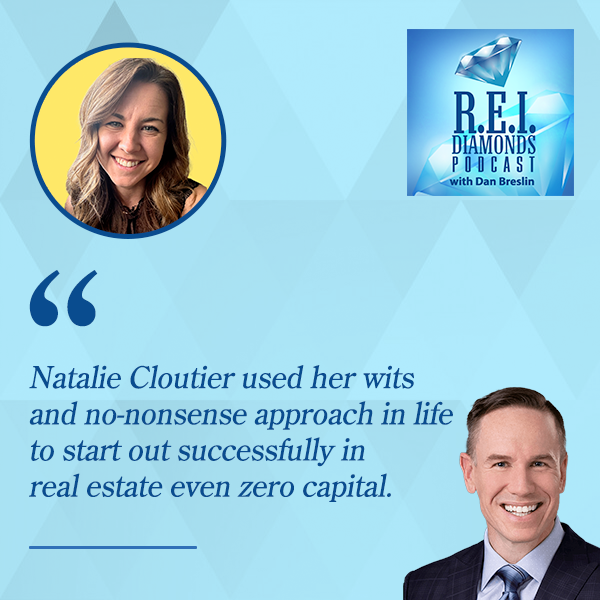
 Natalie Cloutier is a Canadian real estate investor specializing in BRRRR 2.0 (Build, Rent, Refinance, and Repeat) for small multi-family properties. She leverages her architectural background to design and construct dense, high-quality rental assets. She successfully scaled her business from a zero-capital start by continually recycling equity.
Natalie Cloutier is a Canadian real estate investor specializing in BRRRR 2.0 (Build, Rent, Refinance, and Repeat) for small multi-family properties. She leverages her architectural background to design and construct dense, high-quality rental assets. She successfully scaled her business from a zero-capital start by continually recycling equity.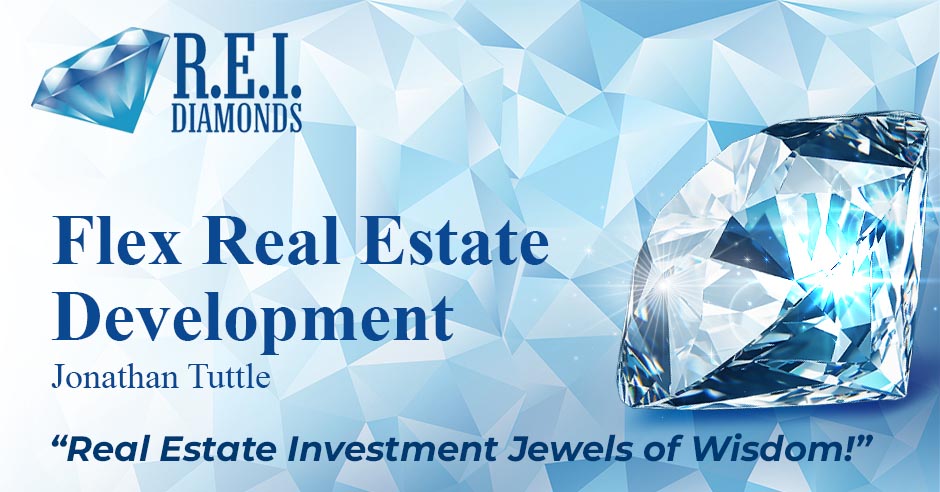
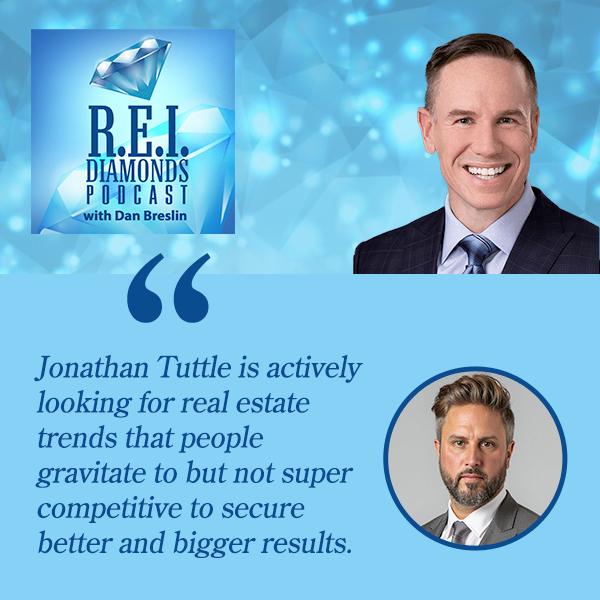
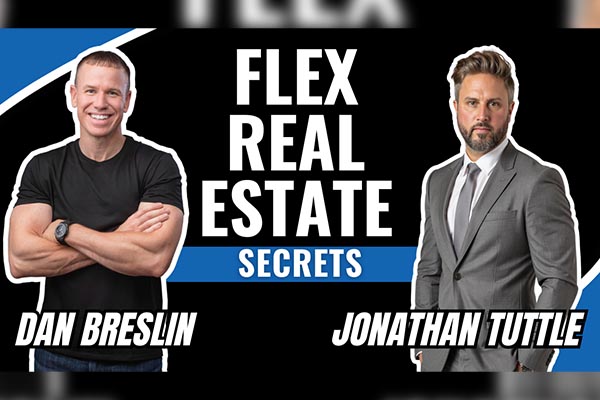
 Jonathan Tuttle is the COO of Land Play, a flex office space development fund. Their focus is ground up development in an underbuilt asset with low vacancy rates and strong profit margins. He is also the Fund Manager at Midwest Park Capital which is a private real estate investment firm providing select and approved accredited investors with exclusive access to high yield investment in the mobile home park vertical. Midwest Park Capital was selected as one of 45 Best Startups Founded in Illinois 2020 & 101 Top Commercial Companies and Startups of 2021.
Jonathan Tuttle is the COO of Land Play, a flex office space development fund. Their focus is ground up development in an underbuilt asset with low vacancy rates and strong profit margins. He is also the Fund Manager at Midwest Park Capital which is a private real estate investment firm providing select and approved accredited investors with exclusive access to high yield investment in the mobile home park vertical. Midwest Park Capital was selected as one of 45 Best Startups Founded in Illinois 2020 & 101 Top Commercial Companies and Startups of 2021.

 Al Romero is a seasoned real estate agent and broker with over 25 years of experience, who also leveraged his background in tech to found Instashow Plus. Driven by the challenges of property showings during the COVID-19 pandemic, he developed Instashow Plus as a secure and automated platform for managing property access and viewings.
Al Romero is a seasoned real estate agent and broker with over 25 years of experience, who also leveraged his background in tech to found Instashow Plus. Driven by the challenges of property showings during the COVID-19 pandemic, he developed Instashow Plus as a secure and automated platform for managing property access and viewings.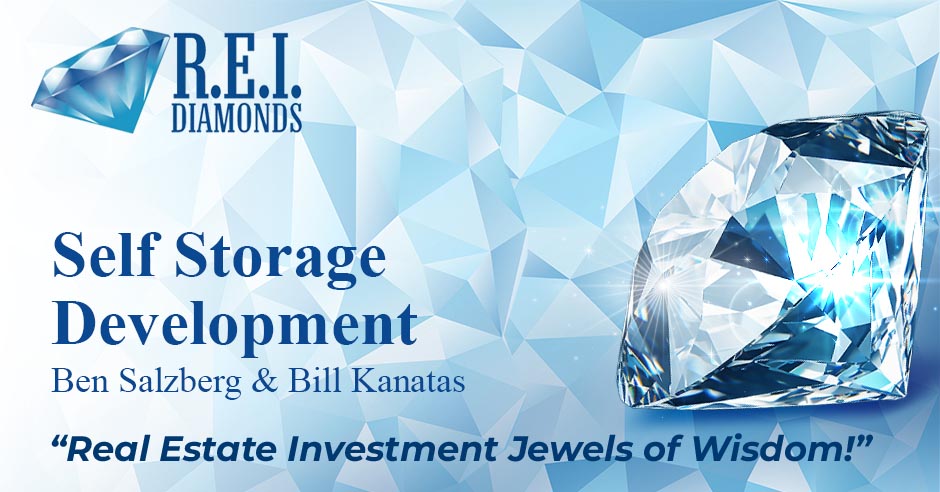
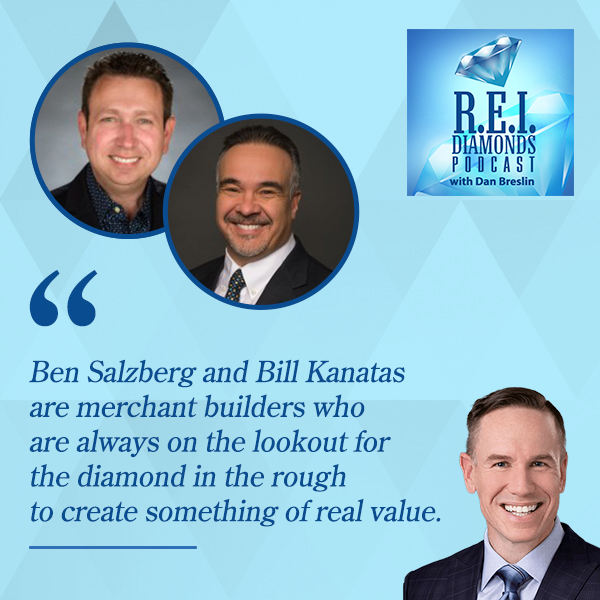
 Benjamin Salzberg brings a background rooted in engineering and quality control, with an MBA specializing in Six Sigma. He has spent over three decades as a commercial real estate broker in Illinois and has recently focused on self-storage investment, recognizing its resilience and strong industry growth. Benjamin combines his analytical skills, engineering background, and strategic insights to identify and develop successful self-storage projects.
Benjamin Salzberg brings a background rooted in engineering and quality control, with an MBA specializing in Six Sigma. He has spent over three decades as a commercial real estate broker in Illinois and has recently focused on self-storage investment, recognizing its resilience and strong industry growth. Benjamin combines his analytical skills, engineering background, and strategic insights to identify and develop successful self-storage projects. Bill Kanatas is a highly experienced real estate developer with over 30 years of expertise spanning retail strip centers, office buildings, residential projects, and, most recently, self-storage facilities. His focus has evolved towards climate-controlled storage and boat/RV storage, with a strong emphasis on land development, entitlements, community relations, and environmental remediation.
Bill Kanatas is a highly experienced real estate developer with over 30 years of expertise spanning retail strip centers, office buildings, residential projects, and, most recently, self-storage facilities. His focus has evolved towards climate-controlled storage and boat/RV storage, with a strong emphasis on land development, entitlements, community relations, and environmental remediation.
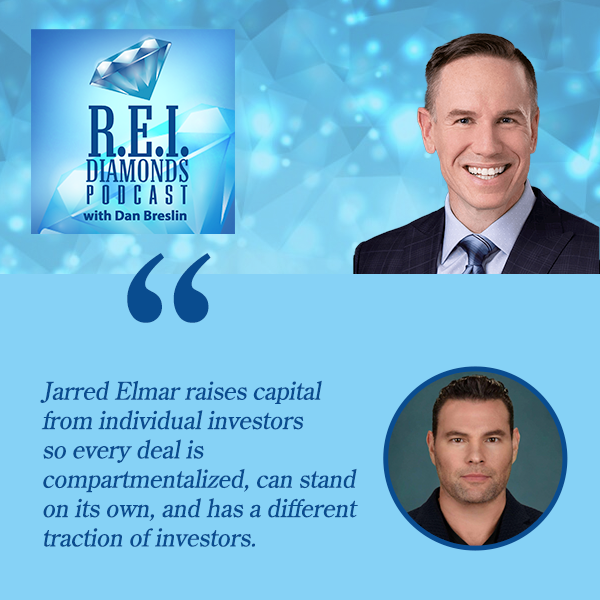
 Jarred Elmar is the Managing Partner of The Geneva Group.
Jarred Elmar is the Managing Partner of The Geneva Group.